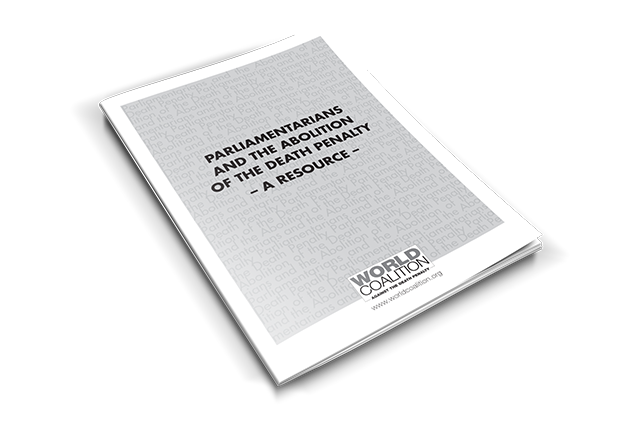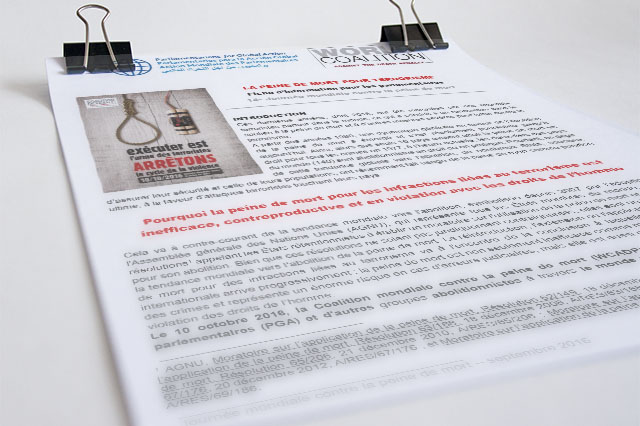Although the Philippines was the first Asian country to abolish the death penalty under the 1987 Constitution, it was re-imposed during the administration of President Fidel Ramos to address the rising crime rate in 1993, only to be abolished again in 2006, after the then President Gloria Macapagal-Arroyo signed a law reducing maximum punishment to life imprisonment. The country subsequently signed and ratified the Second Optional Protocol to the International Covenant on Civil and Political Rights, aiming at the abolition of the death penalty (ICCPR-OP2) on 20 November 2007.
The May 2016 election of President Rodrigo Duterte, who vowed to reintroduce the death penalty to combat drug trafficking in the Philippines and other crimes during his campaign, posed a new serious threat to the protection of human rights in the country. On 7 March 2017, the House of Representatives overwhelmingly passed Bill No. 4727 on the reinstatement of the death penalty for drug-related and “heinous” crimes. The Bill, however, remained stalled in the Senate for the following months due to a lack of support from Senators, including several PGA Members who publicly spoke out against the reintroduction of capital punishment in the country.
Yet, the mid-term elections of May 2019, which gave a majority to senators from President Duterte’s party (PDP-Laban), relaunched the pro-death penalty movement, and 18 concerning bills on this matter were presented to the House of Representatives in September that same year. Although unsuccessful, other attempts were made again in 2020, following a shooting in Tarlac.
On 2 March 2021, the House of Representatives adopted House Bill No. 7814, allowing the reintroduction of the death penalty under the Comprehensive Dangerous Drugs Act of 2002 – the second bill in five years proposing a return to capital punishment that passed to the Senate. But support from Senators who previously positioned themselves in favor of such reinstatement diminished, thus reducing the risk of a return to the use of capital punishment.
Overall, vigilance must prevail, notably considering the coming to power of Ferdinand ‘Bongbong’ Marcos Junior as President and Sara Duterte as Vice President following the presidential elections of May 2022. The threat of a possible reintroduction of the death penalty in the Philippines remains latent.
The Philippines has ratified both the International Covenant on Civil and Political Rights (ICCPR) in 1986 and its Second Optional Protocol aiming at the abolition of the death penalty (ICCPR-OP2) in 2007.
PGA activities on the abolition of the death penalty in the country:
30-31 October 2018: PGA organised, in partnership with ADPAN and Ensemble contre la peine de mort (ECPM), a regional parliamentary seminar entitled “Standing Against Death Penalty in Asia: The Role of Parliamentarians” in Kuala Lumpur (Malaysia). Hon. Tomasito Villarin, Member of the House of Representatives of the Philippines, attended the event and gave an intervention on the experience of the Philippines with the death penalty, including recent efforts to block its reintroduction.
29 November 2017: PGA organized a side-event to its 39th Annual Forum in Milan (Italy), entitled “Moving Away from Capital Punishment in Asia”. The event focused on the issues and arguments particularly relevant to the abolitionist movement in Asian countries. This gave the opportunity to PGA Member Sen. Antonio Trillanes to share his experience with fellow Asian parliamentarians and discuss how to best act against the reintroduction of the death penalty in abolitionist countries.
16 October 2017: PGA issued a statement welcoming the move by nine of the twenty-four Filipino Senators, including PGA Members Sen. Antonio Trillanes and Sen. Leila de Lima, to speak out against the government’s move to reintroduce the death penalty in the country, which led to the relevant Committee to defer its discussion of the bill. Sen. Trillanes also published a statement.







